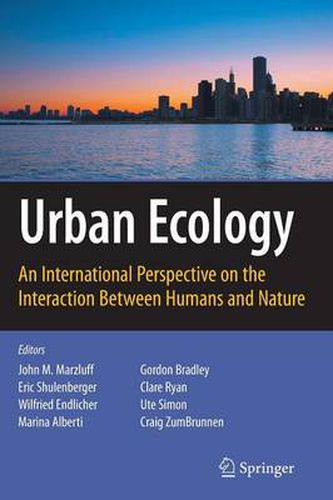Readings Newsletter
Become a Readings Member to make your shopping experience even easier.
Sign in or sign up for free!
You’re not far away from qualifying for FREE standard shipping within Australia
You’ve qualified for FREE standard shipping within Australia
The cart is loading…






This title is printed to order. This book may have been self-published. If so, we cannot guarantee the quality of the content. In the main most books will have gone through the editing process however some may not. We therefore suggest that you be aware of this before ordering this book. If in doubt check either the author or publisher’s details as we are unable to accept any returns unless they are faulty. Please contact us if you have any questions.
Urban Ecology is a rapidly growing field of academic and practical significance. Urban ecologists have published several conference proceedings and regularly contribute to the ecological, architectural, planning, and geography literature. However, important papers in the field that set the foundation for the discipline and illustrate modern approaches from a variety of perspectives and regions of the world have not been collected in a single, accessible book. Foundations of Urban Ecology does this by reprinting important European and American publications, filling gaps in the published literature with a few, targeted original works, and translating key works originally published in German. This edited volume will provide students and professionals with a rich background in all facets of urban ecology.
The editors emphasize the drivers, patterns, processes and effects of human settlement. The papers they synthesize provide readers with a broad understanding of the local and global aspects of settlement through traditional natural and social science lenses. This interdisciplinary vision gives the reader a comprehensive view of the urban ecosystem by introducing drivers, patterns, processes and effects of human settlements and the relationships between humans and other animals, plants, ecosystem processes, and abiotic conditions. The reader learns how human institutions, health, and preferences influence, and are influenced by, the others members of their shared urban ecosystem.
$9.00 standard shipping within Australia
FREE standard shipping within Australia for orders over $100.00
Express & International shipping calculated at checkout
This title is printed to order. This book may have been self-published. If so, we cannot guarantee the quality of the content. In the main most books will have gone through the editing process however some may not. We therefore suggest that you be aware of this before ordering this book. If in doubt check either the author or publisher’s details as we are unable to accept any returns unless they are faulty. Please contact us if you have any questions.
Urban Ecology is a rapidly growing field of academic and practical significance. Urban ecologists have published several conference proceedings and regularly contribute to the ecological, architectural, planning, and geography literature. However, important papers in the field that set the foundation for the discipline and illustrate modern approaches from a variety of perspectives and regions of the world have not been collected in a single, accessible book. Foundations of Urban Ecology does this by reprinting important European and American publications, filling gaps in the published literature with a few, targeted original works, and translating key works originally published in German. This edited volume will provide students and professionals with a rich background in all facets of urban ecology.
The editors emphasize the drivers, patterns, processes and effects of human settlement. The papers they synthesize provide readers with a broad understanding of the local and global aspects of settlement through traditional natural and social science lenses. This interdisciplinary vision gives the reader a comprehensive view of the urban ecosystem by introducing drivers, patterns, processes and effects of human settlements and the relationships between humans and other animals, plants, ecosystem processes, and abiotic conditions. The reader learns how human institutions, health, and preferences influence, and are influenced by, the others members of their shared urban ecosystem.